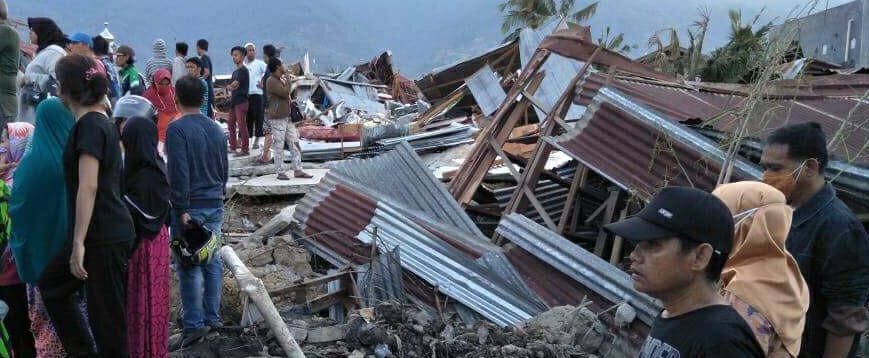The crisis continues – An update on the Indonesian disaster
Since the 7.5 magnitude earthquake and tsunami hit Sulawesi last month, the 1.5 million people affected are still in desperate need of support. The split-second damage caused by the disaster now demands long term solutions.
Perhaps the most alarming issue arising out of the atrocity is the impact on the children of Sulawesi. Is it reported that 5000 children have been separated from their families and 100,000 children are in need of psychological care.* There is a growing concern for children sleeping outside as the rainy season begins. At this time of year, the mosquito population will rise, this poses a serious threat to children’s health as many sleep without a mosquito net.
With living conditions in a vulnerable state, the likelihood of epidemic diseases spreading amongst the population is high. Therefore, there is an urgent demand for clean water and sanitation facilities to reduce the risk of infection spreading. This is putting heightened pressure on healthcare facilities which are already struggling due to the immediate injuries caused by the earthquake.
Infectious disease is not the only health care worry. A vast number of the population have been affected psychologically by this disaster. In particular, people have become extremely fearful of the liquefaction that occurred and the destruction it caused. People watched entire buildings move with the flow as the soil transformed into a liquefied state. Safe spaces, including homes, schools and health centres, were completely destroyed limiting people to the outdoors. The danger of seeking refuge indoors is a huge risk due to structural damage.
[responsive_video type=’youtube’ hide_related=’1′ hide_logo=’0′ hide_controls=’0′ hide_title=’0′ hide_fullscreen=’0′ autoplay=’0′]https://www.youtube.com/watch?v=254EHOgwdio[/responsive_video]
Video from BBC showing liquefaction.
The damage goes beyond buildings, farm land has also been critically affected. Families are struggling to survive as they have been forced to abandon their food sources and livelihoods. This loss of land will have a long lasting impact on the entire population of Sulawesi, as a limited harvest means a limited food supply. This poses as a long term threat to the island.
All We Can has been supporting the humanitarian relief work in Sulawesi. Break through reports from All We Can’s local humanitarian partners in Indonesia have revealed that people in rural areas, previously cut off by damaged roads, are now being reached. All We Can is supporting the distribution of live-saving food, temporary shelter kits and sanitation items.
There is a lot of hard work still to be done. Women are anxious they will not be able to supply their babies with milk due to growing food insecurity levels. People are also in need of long-term shelter solutions as the latest reports suggest up to 82,000 people have been displaced from their homes.** £50 could supply a family with food for an entire month. Safe shelters for £60 could protect families who are otherwise exposed to the outdoor elements.
Give now to enable All We Can to continue supporting lifesaving work in Sulawesi at: allwecan.org.uk/Indonesia
* https://reliefweb.int/report/indonesia/humanitarian-action-children-2018-indonesia
**https://reliefweb.int/report/indonesia/people-are-most-terrified-liquefaction-phenomenon-care-reports-aid-reaches-worst

